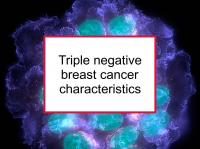Up to 20 percent of invasive breast cancers are classified as triple negative, which refers to the fact that the cells are estrogen receptor negative (ER-), progesterone receptor negative (ER-), and HER2 negative. Treatments that reduce the production of estrogen or block its effects are not useful for this type of breast cancer.
Triple negative breast cancer is also referred to as basal or basal-like breast cancer in some studies.
Triple negative breast cancer risk factors
Women with metabolic syndrome are more likely to have triple negative breast cancer upon diagnosis than women without it. A high cholesterol diet has been shown to induce angiogenesis and accelerate mammary tumor growth in a mouse model of triple negative breast cancer. Systemic inflammation has been shown to increase the metastatic behavior of triple negative breast cancer cells. One study found that 48% of BRCA1 mutation carriers had triple negative breast cancer compared to only 12% of noncarriers.
Characteristics of women with triple negative breast cancer
Women diagnosed with triple negative breast cancer are more likely to be premenopausal than women with hormone receptor positive breast cancer. They are also more likely to be African American or Latina; it has been estimated that approximately 20% of Latinas and 28% of African Americans with breast cancer have triple negative disease compared to 12% of non-Hispanic whites.
Some prescription drugs can influence risk or outcomes
Use of selective serotonin reuptake inhibitors (SSRIs) such as Paxil and Prozac are suspected of increasing the risk of ER-/PR- breast cancer in older women. Use of birth control pills has been reported to increase the risk of triple negative breast cancer in younger women.
There is some evidence that use of lipophilic statins such as Zocor may reduce triple negative recurrence. The type 2 diabetes drug metformin has been shown to reduce the metastatic potential of triple negative breast cancer cells.
Triple negative disease is often responsive to chemotherapy
Triple negative breast cancer is more often responsive to chemotherapy than hormone receptor positive (ER+/PR+) breast cancer. On the other hand, long-term hormonal treatments (tamoxifen, aromatase inhibitors) used for ER+ subtypes are not effective for triple negative breast cancer since estrogen is not the main driver of growth. Therefore, it is important for those with triple negative breast cancer to have surgery and complete the chemotherapy that will in all likelihood be prescribed. The initial treatment period provides the best opportunity for a long or permanent remission. Please see our article on triple negative prognosis.
Young TN patients should be considered for BRCA mutation testing
At least 10% of premenopausal triple negative breast cancer patients have BRCA1 mutations. Several researchers have suggested that all women under 50 with triple negative disease should be tested, even in the absence of a family history. However, many women without familial breast cancer would not qualify for testing under current guidelines.
Sources of information provided in this webpage
The information above, which is updated continually as new research becomes available, has been developed based solely on the results of academic studies. Clicking on any of the underlined terms will take you to its tag or webpage, which contain more extensive information.
Additional comments
There are specific foods that are associated with lower risk of this type of breast cancer and some that are associated with higher risk. Please see our article on what triple negative patients and survivors should eat.
Additional triple negative breast cancer articles
Below are links to some other articles concerning triple negative breast cancer:
